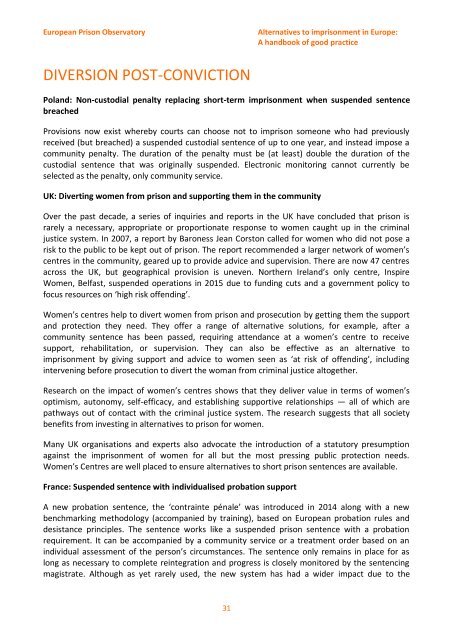good practice
Alternatives%20to%20imprisonment%20in%20Europe
Alternatives%20to%20imprisonment%20in%20Europe
Create successful ePaper yourself
Turn your PDF publications into a flip-book with our unique Google optimized e-Paper software.
European Prison Observatory<br />
Alternatives to imprisonment in Europe:<br />
A handbook of <strong>good</strong> <strong>practice</strong><br />
DIVERSION POST-CONVICTION<br />
Poland: Non-custodial penalty replacing short-term imprisonment when suspended sentence<br />
breached<br />
Provisions now exist whereby courts can choose not to imprison someone who had previously<br />
received (but breached) a suspended custodial sentence of up to one year, and instead impose a<br />
community penalty. The duration of the penalty must be (at least) double the duration of the<br />
custodial sentence that was originally suspended. Electronic monitoring cannot currently be<br />
selected as the penalty, only community service.<br />
UK: Diverting women from prison and supporting them in the community<br />
Over the past decade, a series of inquiries and reports in the UK have concluded that prison is<br />
rarely a necessary, appropriate or proportionate response to women caught up in the criminal<br />
justice system. In 2007, a report by Baroness Jean Corston called for women who did not pose a<br />
risk to the public to be kept out of prison. The report recommended a larger network of women’s<br />
centres in the community, geared up to provide advice and supervision. There are now 47 centres<br />
across the UK, but geographical provision is uneven. Northern Ireland’s only centre, Inspire<br />
Women, Belfast, suspended operations in 2015 due to funding cuts and a government policy to<br />
focus resources on ‘high risk offending’.<br />
Women’s centres help to divert women from prison and prosecution by getting them the support<br />
and protection they need. They offer a range of alternative solutions, for example, after a<br />
community sentence has been passed, requiring attendance at a women’s centre to receive<br />
support, rehabilitation, or supervision. They can also be effective as an alternative to<br />
imprisonment by giving support and advice to women seen as ‘at risk of offending’, including<br />
intervening before prosecution to divert the woman from criminal justice altogether.<br />
Research on the impact of women’s centres shows that they deliver value in terms of women’s<br />
optimism, autonomy, self-efficacy, and establishing supportive relationships — all of which are<br />
pathways out of contact with the criminal justice system. The research suggests that all society<br />
benefits from investing in alternatives to prison for women.<br />
Many UK organisations and experts also advocate the introduction of a statutory presumption<br />
against the imprisonment of women for all but the most pressing public protection needs.<br />
Women’s Centres are well placed to ensure alternatives to short prison sentences are available.<br />
France: Suspended sentence with individualised probation support<br />
A new probation sentence, the ‘contrainte pénale’ was introduced in 2014 along with a new<br />
benchmarking methodology (accompanied by training), based on European probation rules and<br />
desistance principles. The sentence works like a suspended prison sentence with a probation<br />
requirement. It can be accompanied by a community service or a treatment order based on an<br />
individual assessment of the person’s circumstances. The sentence only remains in place for as<br />
long as necessary to complete reintegration and progress is closely monitored by the sentencing<br />
magistrate. Although as yet rarely used, the new system has had a wider impact due to the<br />
31





